《中国传统文化》英文版3.孔子与儒家思想解析
- 格式:ppt
- 大小:876.50 KB
- 文档页数:49
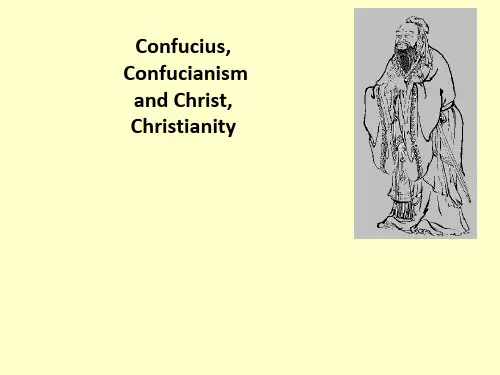
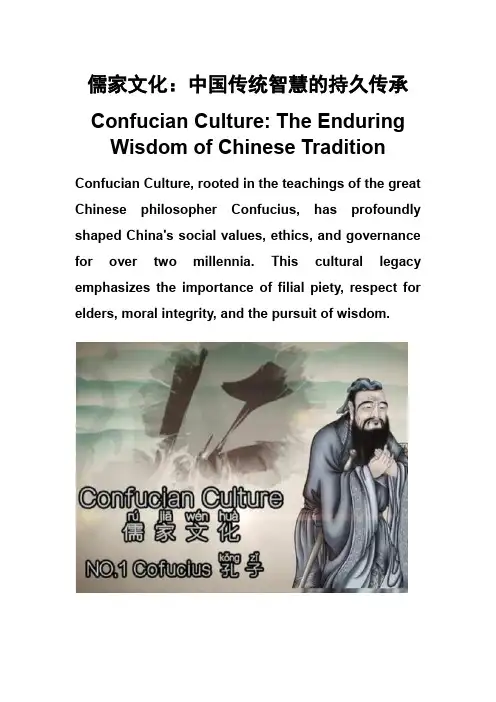
儒家文化:中国传统智慧的持久传承Confucian Culture: The EnduringWisdom of Chinese Tradition Confucian Culture, rooted in the teachings of the great Chinese philosopher Confucius, has profoundly shaped China's social values, ethics, and governance for over two millennia. This cultural legacy emphasizes the importance of filial piety, respect for elders, moral integrity, and the pursuit of wisdom.At the heart of Confucianism lies the belief in creating a harmonious society through self-cultivation and moral conduct. The five key relationships, including ruler-subject, parent-child, husband-wife, elder-younger, and friend-friend, form the foundation of Confucian ethics, guiding individuals on the path of righteousness and compassion.Confucian classics, such as the Analects, have been cherished throughout history for their profound insights into human nature and virtue. These teachings have served as a moral compass, fostering a sense of responsibility and duty among individuals in both public and private life.The enduring influence of Confucian Culture extends beyond China's borders, as neighboring countries in East Asia, like Japan and Korea, have also been profoundly influenced by its principles.In modern times, Confucianism remains an integral part of Chinese identity, providing valuable insights into maintaining social harmony and ethical conduct amidst rapid societal changes. It continues to be a source of inspiration and guidance for individuals seeking to cultivate wisdom and live a meaningful life. Confucian Culture exemplifies the timeless wisdom of Chinese tradition, offering profound philosophical perspectives that have stood the test of time.儒家文化:中国传统智慧的持久传承儒家文化,扎根于伟大的中国哲学家孔子的教诲,已经深刻地影响了中国社会的价值观、伦理道德和治理理念长达两千多年。
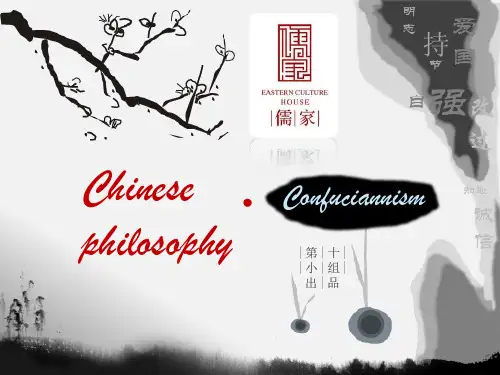

关于孔子和儒家思想的英语作文Confucius and ConfucianismConfucius, also known as Kong Qiu or Master Kong, was a Chinese philosopher who lived during the Spring and Autumn period of Chinese history, approximately 551-479 BCE. He is considered one of the most influential thinkers in Chinese history and the founder of the philosophical system known as Confucianism.Confucius was born in the state of Lu, which is now part of modern-day Shandong province. He came from a noble family, but his father died when he was young, and the family fell on hard times. Despite this, Confucius was able to receive a good education and later became a teacher himself, imparting his wisdom and knowledge to his students.The core of Confucianism is the belief in the importance of human relationships and the cultivation of virtues such as benevolence, righteousness, propriety, wisdom, and filial piety. Confucius believed that by cultivating these virtues, individuals could achieve personal and social harmony, and that this, in turn, would lead to a well-ordered and prosperous society.One of the central concepts in Confucianism is the idea of the "Mandate of Heaven," which holds that the ruler's authority is granted by Heaven (or the divine) and that the ruler must govern with virtue and benevolence in order to maintain this mandate. If the ruler fails to govern justly, then Heaven may withdraw its mandate, and the people have the right to overthrow the ruler.Another key aspect of Confucianism is the emphasis on education and self-cultivation. Confucius believed that education was essential for the development of moral character and that individuals should strive to become cultivated, virtuous, and socially responsible citizens. He also believed that the study of the Classics, which included works such as the Analects, the Book of Changes, and the Book of Rites, was crucial for this process of self-cultivation.Confucianism also places a strong emphasis on the importance of social roles and hierarchical relationships. Individuals were expected to fulfill their duties and obligations within the family and society, and to respect the authority of those in positions of power. This included the relationship between ruler and subject, father and son, and husband and wife.Despite its emphasis on hierarchy and social order, Confucianism also recognizes the importance of individual autonomy and theability of individuals to shape their own destinies. Confucius believed that individuals could cultivate their own moral character and that this would ultimately lead to a more harmonious and well-ordered society.One of the key figures in the development of Confucianism was Mencius, a disciple of Confucius who lived approximately 370-290 BCE. Mencius expanded on Confucius's ideas and argued that human nature was inherently good and that individuals could achieve moral perfection through self-cultivation and the practice of benevolence.Another important figure in the Confucian tradition was Xunzi, who lived approximately 310-230 BCE. Xunzi disagreed with Mencius's view of human nature as inherently good and argued that human nature was inherently selfish and that individuals needed to be trained and disciplined in order to cultivate virtuous behavior.Over the centuries, Confucianism has had a profound impact on Chinese culture and society, influencing everything from politics and government to education and social norms. It has also spread to other parts of East Asia, including Korea, Japan, and Vietnam, and has had a lasting impact on the cultural and intellectual traditions of these regions.Despite its enduring influence, Confucianism has also faced criticismand challenges over the years. Some have argued that its emphasis on hierarchy and social order is too rigid and restrictive, and that it fails to adequately address issues of individual rights and social justice. Others have criticized its patriarchal and hierarchical structure, and its perceived lack of attention to the needs and concerns of women and marginalized groups.Nevertheless, Confucianism remains an important and influential philosophical and cultural tradition, and its core values and teachings continue to be studied and debated by scholars and thinkers around the world. As we grapple with the challenges of the modern world, the wisdom and insights of Confucius and his followers may offer valuable lessons and perspectives that can help us navigate the complexities of human relationships, social order, and personal and societal well-being.。
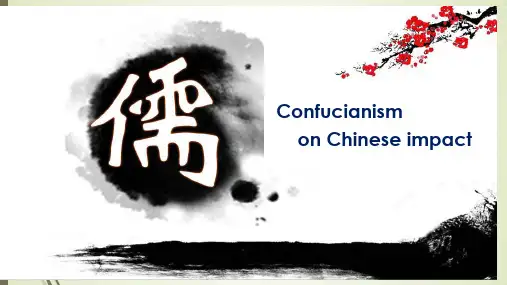

儒家思想英文介绍Name: Jiawen ChenConfucianismConfucianism is created by Confucius. He is a great thinker, educator, and politician in ancient China between BC 551 to BC 479. However, he is not someone god, son of god, or prophet. He is only an ordinary people who has hundreds of thousand student in China. And he created the Confucianism theory which is the most influential theory in China and it continue to effect most Chinese in now a day. Some cities in China has the Confucius temple to worship him and regard him as sage. But Confucius was not his real name. It was a courtesy title, a Latinized form of “Kong Fuzi”, meaning “Master Kong”. His family name was Kong an d his given nameis Qiu. And he styled himself Zhongni. He was born at Zouyi, the State of Lu in ancient China.As one of the greatest thinkers and educators in the history of China, Confucius’ legacy lie s in the following three aspects: Firstly, he compiled and preserved the literary works, The Six Cl assics, including Shi, Shu, Li, Yue, Yi and Chun Qiu, which are regarded as the classics of Conf ucianism. The accomplishment makes a large impact on the succession and development of the tr aditional Chinese culture.The Confucianism started at middle China. And it happened in the Spring and Autumn Period or Warring State Period. During that time, there are some states separated from the Zhou dynasty, and they fight each other year by year. And that division time, it caused too many great thinker exist and all of these great thinker wanted to introduce and spread out there theory to one of those kings and hope one of kings would like their theory and finallyto conquer other states, and rule the whole China. Confucianism is one of the famous theory existed in that time. Even the Qin state conquer all other states without using the Confucianism. But after Qin dynasty,Confucianism has become the mainstream theory for emperor used to rule China and educate Chinese, until today, Chinese people is still educated and effected by Confucianism.Confucius built up a system of philosophical thoughts with Ren as its basic virtue, and Ren is core theory in Confucianism and this is what Chinses want to believe. First, Ren theory can be humanity, benevolence, humanness and selflessness, and Ren is the virtue of perfectly fulfilling one's responsibilities toward others.Secondly, Confucius built up a system of philosophical thoughts with Ren as its basic virtue. This virtue is the central theme of his Analects9. He considered Ren as the first and highest criterion of man’s behavior and the core of morality. Ren meant to “love other men”;to help others to be established when one wished to be established oneself; and help others to be successful when one wished to be successful oneself. Confucius’concept of Li refers to a set of ritual and musical systems, with the hierarchical system as its core. Ren and Li are complementary: Li is the exterior principle of Ren while Ren is Li’s intrinsic guiding power. To accomplish Ren, one must abide by Li, and Ren will be naturally generated in the process of practicing Li. Fundamentally, the purpose of Confucius’ Li is to restore the traditional rites of the Zhou Dynasty.There is no certain god in Confucianism, they believe the sky is god, earth is god, we can say the nature is god, in Chinese called Tian. Chinese people worship Tian to hope they can have better future, they hope Tian can help them to achieve personalgoal. For example, if a farm worship to Tian, he might hope the weather would be comfortable for the agriculture growth. And they are also afraid Tian. Like some nature disaster happened, people would think this is a penalty for people from Tian.There is a few real believer is China, but almost Chinese were effected by Confucianism. In modern China, Confucianism is use to education in most time, but it is not like belief in China. Student would learn what Confucius said and wrote, and try to understand the theory. Because the theory is always right and accept by Chinese people, and they believe Confucianism theory can also help them be a better man if you learn Confucianism. And government also accept Confucianism as mainstream theory in society, because government also think it would help society become harmony.。
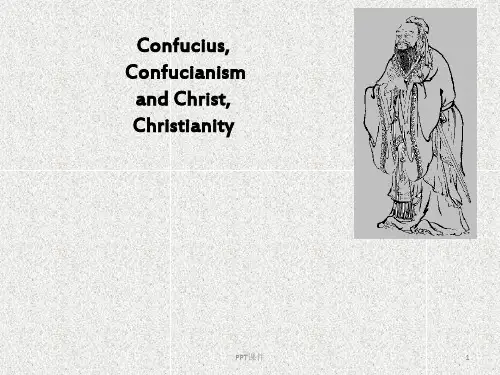
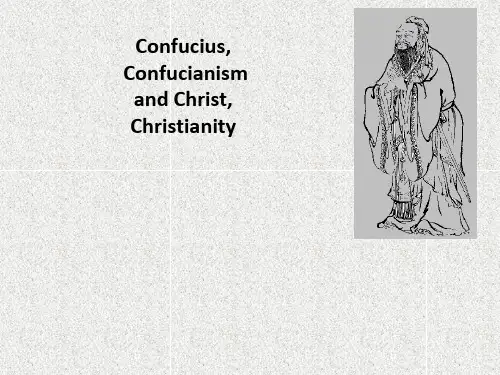

The east’s Socrates-- ConfuciusIn the history of human, a series of ideologists played quite important roles in various field, they had a far-reaoching influence on the development of human society. it can be said that they were like the engine of history who promoted civilization to improve. In the west, there were Platon, Aristotle, Socrates who were well-known for theirs’ ideology about society, humanity, science, nature. The ideal country, wrote by Platon, it records the dialogue of Socrates and others,. It is the summary of his former philosophy of Platon, it discusses the philosophy, politics, ethics, education, art. Platon believed that a good country should have wisdom, courage, self-control, justice. We have to belive that the ideology of them was used for reference by modern people to formulate all kinds of humanized laws, raise the level of Education .what is more important, it teach us how to be justice and moral people.In the ancient east, there were a group of people who did the same things just like Platon, Aristotle, Socrates. Among the ancient China, there are two very dazzling ideology denominations in more than one hundred ideology denominations. One is confucianist, the other is Taoists. Confucius is one of the most representative figures of confucianist, and he is the pioneer of confucianist. And Lao Zi is one of the most representative figures of Taoists, and he is the pioneer of Taoists. Confucius and Lao Zi’s ideology have been influencing Chinese culture for more than two thousand years. It is not little exaggerated to say that Confucius’s ideology is the core of Chinese culture and civilization.Confucius was born in Dilu Chou in BC 551, he is famous as one great thinker and educator. It is believed that Confucius’s ideology has become the reed of the feudal culture even modern culture in China for two thousand years, even he is considered to be the greatest Chinese sage by all people of the world. When Confucius was 15 years old, he was cognizant of the meaning of life .so he was ambition in learning in life and getting widespread knowledge. After many life-changing events, Confucius began to travel around other countries to share his ideology. However those monarchs don’t agree him, So he got back to Lu in the end. At that time, Confucius still had a heart in politics, but the monarch of Lu didn’t reach to an agreement on how to administer a country. Confucius thought that running one country with charity is quite ridiculous. so he just put Confucius in an unimportant position. Confucius thought the monarch of Lu and other ministers didn’t understand him, so he began to pay his whole attention to education. Confucius broke the monopoly of education, recruited students regardless of social level. Besides, he didn’t require students to give money to him. (I think Confucius could be compared with Socrates, because their behavior is so much alike.) Confucius taught students without Discrimination and educate different students according to their different aptitude. So his teaching skills was advance at that time. It was said that his students add up to three thousand people, there were 72 excellent people, who were called wise men by other people. In Confucius's all life, he did not write a book to promote his ideology, but that is no influent in reducing his influence to thousand years of Chinese culture. We can get Confucius’s ideology through his students’ depiction and many books wrote by otherpeople which recorded his ideology. For example, Confucius’s basic teachings were systematically collected and made into the Analects of Confucius by his students after his death.Confucius’s ideology extend to morality, polity, economy, culture, aesthetics, history and education. Confucius constructed a complete ideological system of "morality. He thought humanism is the eternal theme of human in any age, it is applicable to any government .And the order and the system of merciful society is the basic requirements to establish human civilization. His ideology of humanism and the spirit of order are the essence of ancient Chinese social and political thought. Confucius called the highest society’s goal "Great Harmony”. It means that people don’t only love their own family but also treat other people like members of their own family. And everyone can feel that he is important for others, find their own proper position in society. There is no fraud, no harm, and no injustice. China is a country who believes in socialism, it is believed that Confucius’s ideology has Influence on the government of China. The core of Confucius's political thought is kindness and gentleness. And he thought the government should be gracious and polite to common people and serve the people instead of squeezing them. Although none was serious to achieve at that time, he has many followers over the next few thousand years. In modern age, I think Sun Zhongshan and Mao Zedong are more or less affected by Confucius's political thought. The core of Confucius's economic thought is that businessmen should be honest in economic activities. And he strongly hated those people who do all kinds of bad things to their own profit at other people’s expense. The core of Confucius's aesthetic thought is beauty truth, kindness and beauty. He thought that we should put literature, art and political morality together, literature and art as a means to change the social and political means, an important way to cultivate sentiment. And Confucius believes that one person should do well in poetry, etiquette and music. Confucius's aesthetic thought has great influence on the literature and art.Confucian culture is not only the core of Chinese culture, but also has deep influence on Japan and Korea. Today, with the arrival of globalization, Confucian culture begins to spread around the world, and Confucius's ideology is beginning to be accepted by the increasing number of people. Many countries have already set up Confucius Institutes to learn Chinese culture. However maybe we spends too much time in developing the economy. I think Chinese is beginning to neglect the core of Chinese.But I think we will pay attention to the traditional culture again after people have rich lives.。
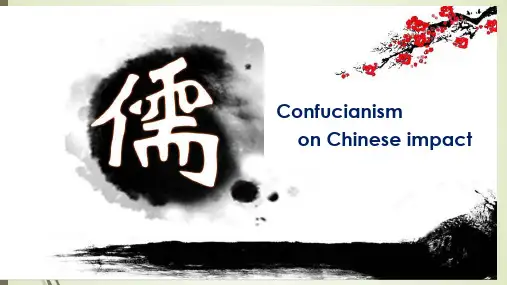

Confucius's Thought and Chinese Culture inthe Global ContextConfucius, a renowned philosopher and thinker from ancient China, has left a profound impact on both Chinese culture and global thought. His teachings, known as Confucianism,强调仁爱、礼义、忠诚等 values, have shaped the ethical, social, and political landscape of China for thousands of years. In the modern era, as the influence of Chinese culture expands globally, the relevance and significance of Confucius's thought become increasingly apparent.Confucius's teaching强调 the importance of human relationships, particularly those based on affinity and respect. The concept of "ren" (仁), which translates to "benevolence" or "humaneness," is at the core of Confucian ethics. It emphasizes the importance of empathy, kindness, and consideration towards others, regardless of theirsocial status or relationship to oneself. This philosophy promotes a harmonious society based on mutual respect and understanding, rather than conflict and competition.The concept of "li" (礼) also plays a crucial role in Confucianism. It refers to the set of social norms andrituals that govern interpersonal relationships andmaintain social order. By following these rituals, individuals are expected to show respect and deference to elders, authorities, and those in higher social positions. This emphasis on respect and order contributes to the stability and harmony of Chinese society.In addition to its domestic influence, Confucianism has also had a significant impact on global culture and thought. Many of its values, such as respect for elders, the importance of education, and the promotion of harmonious relationships, are universal and applicable acrossdifferent cultures and contexts. As a result, Confucianism has gained increasing recognition and interest fromscholars and thinkers worldwide.Moreover, Confucius's thought provides a valuable perspective on global issues such as ethics, sustainability, and social justice. His emphasis on humaneness and harmony offers a unique approach to addressing these challenges,one that emphasizes the importance of balancing individual interests with the needs of society and the environment.In conclusion, Confucius's thought and Chinese culture represent a rich and profound tradition that has shaped the history and development of China for millennia. Its values and teachings, which emphasize benevolence, respect, and harmony, are not only relevant but also offer valuable insights for addressing the challenges of the modern world. As China's influence continues to grow globally, so toowill the influence of Confucius's thought, serving as a bridge between Eastern and Western thought and promoting mutual understanding and respect among people of different cultures and backgrounds.**孔子思想与中华文化在全球语境中的影响**孔子,这位来自古代中国的著名哲学家和思想家,对中华文化乃至全球思想产生了深远影响。